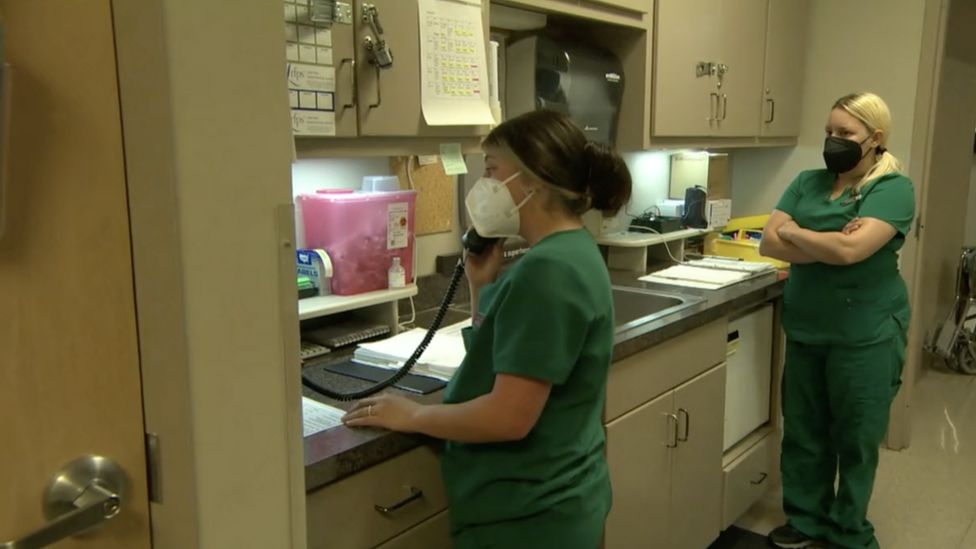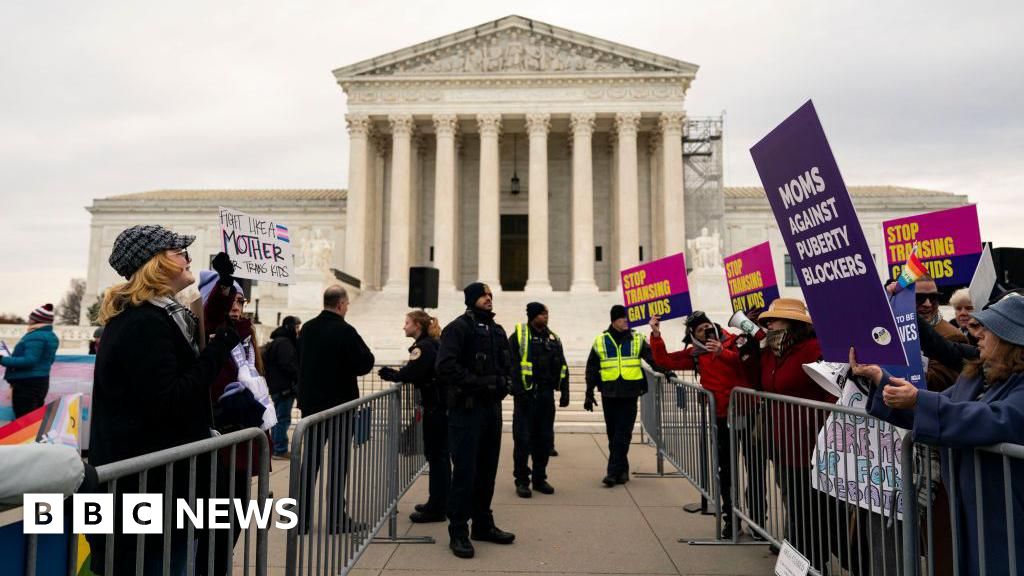ARTICLE AD BOX
By Samantha Granville
BBC News, Little Rock, Arkansas

Staff call patients to cancel abortion
There was a palpable change in the atmosphere at an abortion clinic in Little Rock, Arkansas the morning the Supreme Court overturned Roe v Wade.
That was the moment everything turned upside down.
The doors at the end of the hallway that leads to the patient area were instantly shut - behind them, you could hear the sound of sobs.
The BBC has spent the last three weeks at the clinic, Little Rock Family Planning Services, interviewing the staff and patients who come through its doors. Usually, we've been greeted with joyful hellos.
But when the decision came down, we were asked to leave immediately so they could have time alone to process.
The escorts at the clinic, who have stood in the Arkansas heat day in and day out to accompany patients through the throng of anti-abortion protesters who often gather outside, held a group hug.
"I thought that this country would still care about people. Would still care about women," said Miss Karen, the lead escort.
Outside, anti-abortion protesters celebrated, but said there was more that needed to change.
"It will be a day of celebration, but we will not fully celebrate until abortion is eradicated from our land," Hoyt Plunkett told the BBC.
"You are on notice!" shouted another protester, at people still parking their cars at the clinic. They hadn't heard about the decision yet.
"My suggestion is for you to turn around and leave this place of sin, this place of inequity, this evil place," the protester said.
Across America, clinics like the one in Little Rock are shutting their doors, presumably for the last time. Arkansas, along with 12 other states in the US, has a so-called "trigger" law banning abortion should Roe v Wade be overturned. When the Supreme Court issued their decision on Friday morning, giving states the authority to restrict abortion, these trigger laws began to come into force.
While some states, like Texas, had written waiting periods into the law, delaying the inevitable, Arkansas had written its trigger law to come into force as soon as the state's attorney general - its top lawyer - certified that the Supreme Court gave them the power to do so.
Leslie Rutledge, Arkansas' Republican attorney general, told the BBC she supported the trigger law and the Supreme Court's decision.
"I think many of us didn't think it would perhaps ever happen in our lifetimes," she said.
Abortion is only legal to save the life of the mother - there are no exceptions for rape or incest.
"This is an innocent life that we're talking about. And that innocent life that begins at conception," Ms Rutledge said.
"(Just) because it was formed under evil circumstances doesn't make that innocent child evil."
Now, people in Arkansas who are facing an unwanted pregnancy have fewer options. They can go out of state to have an abortion—the closest clinic in a state that allows abortion is 5 hours away—or they can decide to keep their child.
The state has no paid family leave, and Medicaid - publicly funded health insurance - only covers low-income mothers for 60 days after they give birth.
Ms Rutledge said the government of Arkansas has "always been there to support those mothers", but that they "always need to look for more ways to provide for parents who want to be loving parents, and to make sure that we take care of those children".
Jenifer Thompson, a patient and then an employee, says the clinic saved her life
The staff at Little Rock Family Planning spent the morning calling patients to cancel appointments and help them rebook in different states..
Ashli Hunt, a registered nurse, broke down in tears this morning and immediately had to run outside to catch her breath.
"No matter how hard we prepare for bad news, when it finally hits, it hits HARD. Having to call these patients and tell them Roe V Wade was overturned is heart-breaking," she said a few hours later, after she had time to process the news.
She's worked at the clinic for 14 years. Ashli said she's heartbroken for the patients who are losing their choice, but also that for herself.
"Not only are they taking the choice, away from women, but they're taking what I feel like I should be doing away from me," she said. "You know what my choice is included in that."
Jenifer Thompson, who first came here as a patient over a decade ago before becoming a member of staff, said the clinic helped save her life.
She said that after getting an abortion here, and help getting contraception, she was so impressed by the care they offered that she began to volunteer. She eventually became a paid staff member, and got her nursing degree. Struggles with alcohol led to her getting fired, but she said "the best boss in the world" gave her a second chance by re-hiring her after she began recovery.
Pro-choice protesters outside Arkansas state house
Now, she says she is devastated she will no longer be able to help women as she was once helped.
I have to tell them, I'm sorry, but there's nothing I can do for you. I'm sorry that your boyfriend beats you every day, and that he rapes you all the time, you're gonna have to find somewhere else to go," she said.
"I mean, I can give them information to help try, but it's heart-breaking man, like, you know, this place saved my life literally, multiple times."
Later Friday evening, about 1,000 protesters gathered outside the state house, mostly to condemn the Supreme Court's decision.
One of the clinic's escorts was there.
"Today we mourn. Tomorrow we fight," she said.

 2 years ago
120
2 years ago
120








 English (US) ·
English (US) ·